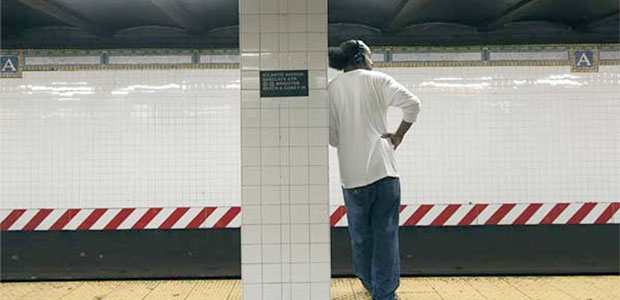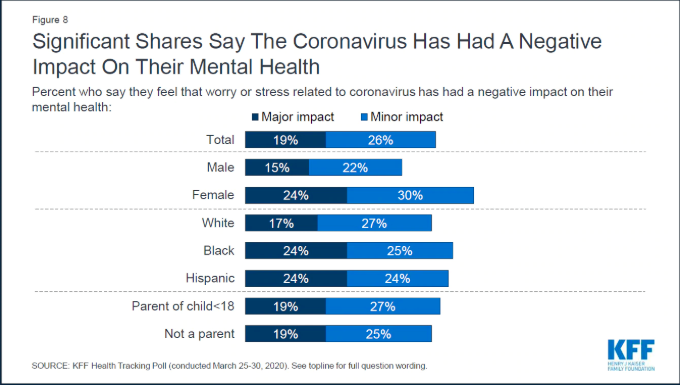
For Half of Americans, the Coronavirus is Harming their Mental Health
According to a recent study, nearly 45 percent of adults say the pandemic has affected their mental health—even with differences in occupation, location and more. Some are calling it now a nationwide, psychological trauma.
It’s no question the coronavirus is affecting nearly every facet of American life: job stability, pay, the economy, personal lives and more. But what about mental health? According to a nationwide survey published on April 2, and The Washington Post, the pandemic has escalated to a nationwide, psychological concern.
A tracking poll by the Kaiser Family Foundation, conducted March 25 to 30, found that 45 percent of adults say the pandemic has affected their mental health, and 19 percent say it has had a “major impact.” The rates are slightly higher among women, Hispanic adults and black adults, the survey found.
A nationwide, psychological concern is not comforting at all, but it might be calming to know that if you’re scared, anxious, depressed, struggling to sleep, or just on edge, you are not alone.
The Washington Post article outlines the numbers: those who have felt a major or minor impact on their mental health, gender, race and parental status. Here are the results:

“It’s a huge number,” said Kathy HoganBruen, a clinical psychologist who specializes in anxiety disorders. “But it’s not surprising.”
These last few weeks have caused the entire country to swing towards fears of joblessness, anxieties about the virus and social distancing, which can cause social isolation.
“It’s not surprising given all the other huge numbers surrounding the pandemic in terms of joblessness and social distancing…and people dying. People getting sick…All of these big numbers are going to have an outsized impact on our mental health collectively.”
Other mental health experts say with a highly disruptive health emergency like this one, it is normal for people to be anxious and worried.
Luckily, if you are feeling this way, you are not alone, and there are coping mechanisms.
Write down your fears either on a piece of paper or a computer. Joshua Gordon, director of the National Institute of Mental Health, said “just the act of writing [your fears] down can really help you, number one, crystallize what your concerns are, and then number two, leave them behind on the paper or the computer file.”
Also, communicate your fears to others. By sharing your fears, you can learn that that caring also has those fears and worries.
Cut back on negative behaviors like excessive alcohol consumption or overeating. This is easier said than done, especially while cooped up inside your home, but these negative behaviors can often breed unhealthy anxieties.
Find ways to connect—and disconnect. Luckily, we have the technology that allows us to contact our friends and family even via video. Make sure you are exercising so as to give your brain a mental break from everything, especially since news headlines can seem suffocating right now.
“Think about what makes you feel better, what helps improve your mental health and how you can do that with such limited resources right now. Think about social support—how to access friends and family online, to reach out to people, and develop new communities if you didn’t have that before. How to get exercise,” said HoganBruen.
The article and health officials also pointed out that while many people are feeling anxious and unsettled right now, the pandemic is not a diagnostic tool for surveying mental health. A feeling of anxiety meets the criteria for a disorder when it interferes with a person’s normal functioning such as grocery shopping, cleaning their home, getting the mail etc.
The Kaiser Family Foundation poll also identified other worries many people have. Of the respondents, 57 percent said they’re worried they could be exposed to the virus because they can’t afford to miss work and can’t stay home. That’s up from 35 percent two weeks earlier.
Fear of infection is dropping slightly, however. Two weeks ago, 62 percent of respondents said they were worried someone in their family will get sick with the virus. Now, that has dropped to about 53 percent—a possible sign that people feel the country’s social distancing efforts are somewhat effective at lowering risks.
At the end of the day, hold yourself and the ones you love accountable. Check in on loved ones, ask yourself what makes you happy and remind yourself that what you’re feeling is normal. Focus on what you can control right now and stay healthy.